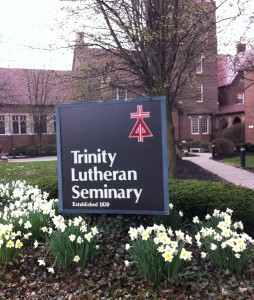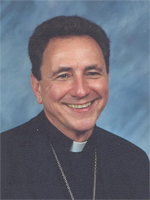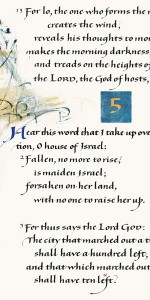
When I returned to the hotel for the NWCU, just before noon, I attended a luncheon meeting that focused upon a new way forward in race and catholicity. The afternoon was devoted to seminars for the various denominational groups. I chose to attend the Catholic meeting with my friend Fr. Tom Ryan, CSP. This session was clearly the right one for me personally. The presenter was Rev. Don McCoid, the ecumenical officer of the Evangelical Lutheran Church in America (ELCA). Don was a highlight for me personally. I hope we become friends soon. We met face-to-face and plans are underway for us to share a meal here in Chicago since he works out of the ELCA national ministry center near O’Hare Airport.

The characteristics of full communion have both theological and missiological implications that grow out of the gospel and thus allow variety and flexibility. These characteristics stress that the church act ecumenically for the sake of the world, not for itself alone. They include, but are not limited to, the following:
1. A common confession of the Christian faith.
2. A mutual recognition of baptism and a sharing of the Lord’s Supper, allowing for joint worship and an exchangeability of members.
3. A mutual recognition and availability of ordained ministers to the service of all members of the church in full communion, subject only but always to the disciplinary regulation of the other churches.
4. A common commitment to evangelism, witness and service.
5. A means of common decision making on critical common issues of faith and life.
6. A mutual lifting of any condemnations that exist between churches.
This may not seem significant at first glance but this is a rather amazing development that has taken place over the past several decades. These respective Protestant churches have agreed that the way forward is “Affirmation & Admonition.” There is, behind this unity, an emphasis upon the Lutheran view of the “priesthood of the baptized.” This all resulted in the “Joint Declaration on the Doctrine of Justification” in 1999. The “Joint Declaration on the Doctrine of Justification” was agreed to by the Roman Catholic Church’s Pontifical Council for Promoting Christian Unity (PCPCU) and the Lutheran World Federation (LWF) as a direct result of extensive ecumenical dialogue. The declaration states that the Catholic and Lutheran churches now share “a common understanding of our justification by God’s grace through faith in Christ.” To the parties involved, this essentially resolves the conflict over the nature of justification which was at the root of the Reformation, or at least the major parts of the conflict. This is why I repeatedly urge everyone to read this document. I frequently receive criticism from very conservative Catholics, and very conservative evangelicals who both seem to have missed this unique moment in our modern Christian history. All of this has led to what has been rightly called “differentiated participation.” We are different, and we remain different both doctrinally and missionally, but we can participate in some things that before the 1960s would have been unthinkable to our respect communions. I see these as some of the huge gains of the modern ecumenical movement.
The two evening worship services at the NWCU were respectively held at the Catholic Cathedral and Trinity Episcopal Church in Columbus. The planners did something in these two services that it appears, to me at least, was not normally done. Each night they had the eucharist. In the Catholic Cathedral the Protestants sat and prayed when the meal was taken and at Trinity Episcopal the Catholics did the same. It was stated that by these prayers and actions we would be reminded that we were still divided. It certainly had that effect but I profoundly doubt that this accomplished what the planners hoped for in putting “the table that divides” into our meeting. Be that as it may I was most disappointed in the Protestant worship. There were several reasons for this but the primary one was the sermon given by the Episcopal priest who was the homilist for the Protestant service. I grieved deeply over his words. He politicized his entire homily and never made one reference to the Gospel text. He went through a litany of all the various denominations present praising each for their unique contribution to unity. He selected the most liberal and progressive parts of each tradition to emphasize his point. It seemed to me that he wanted to remind us that issues like becoming religious pluralists, and creating welcome and affirming churches that embrace same-sex marriage, are right at the top of our ecumenical points of real progress. I know many Catholics were as grieved as much as I was by this terribly weak sermon which had not a word of the Holy Scripture in it from anything I could discern!

The closing address of the final morning was given by Kathryn Lohre, the president of the National Council of Churches. The NCC is in deep trouble. It is about to move the headquarters of the NCC offices to Washington, DC. The budget is faltering and the future is not bright. I felt Kathryn injected some “new life” into the conversation about the “new ecumenism” but I do not get any feeling that an evangelical presence will be welcomed by the NCC in the future. I believe the NCC has so directed its attention to political ideology that its mission is almost entirely lost in terms of the good news of Christ. I also believe that the World Council of Churches (WCC) has a much brighter future for very different reasons, providing it avoids the same mistakes the NCC has made and the WCC has sometimes made. These comments all deserve much more attention, I realize, but I make them because some readers will likely wonder what I think of these well-known ecumenical models. Kathryn did make one hugely important point–all of these efforts will come to naught unless the younger generation becomes engaged in ecumenism. She suggested that this could be a “springtime” for ecumenism. I happen to profoundly agree with her. I believe millennials are less and less concerned about denominations and schism and more and more open to solving problems together. This is a major reason why I believe God gave me the vision that he did and why ACT3 Network exists, to serve and speak into this new ecumenical space that seems to be growing around the world.
All in all, the NWCU was a good conference for me to attend last week. I made a number of new friendships. (This is always a highlight.) I also learned a great deal from other brothers and sisters and from many of the older forms of ecumenism that I have read a great deal about but never experienced in such a first-hand context. I will think about going to the NWCU again but right now other priorities are higher on my agenda for 2014. Some days I can only think about the next six weeks so time will tell. I ask the Lord to guide my every step in serving the church in this cause of missional-ecumenism. The NWCU helped me better understand the breadth and width of what ecumenism is, and where it has been growing and changing in my lifetime. I feel like a neophyte but I also believe my evangelical roots position me to love the gospel and all Christians everywhere.
After sharing in the ecumenical movement at many levels, both here and abroad, I am convinced of the truth of the statement made by the late Methodist theologian Albert Outler: “The landscape has changed forever.”
The post-Reformation, post-Vatican II, post-Christendom church will never be able to go back to a pristine, earlier time. The truth is there never was such a time and there never will be until the Lord returns. But we can go forward in faith, hope and love.
Related Posts
Comments
My Latest Book!

Use Promo code UNITY for 40% discount!






Charles Gilliland liked this on Facebook.
Love it! http://usatoday30.usatoday.com/news/religion/story/2011-09-18/saint-johns-bible/50456938/1
Thanks for the clear report. The last paragraph is such a gem!
Greg Metzger liked this on Facebook.